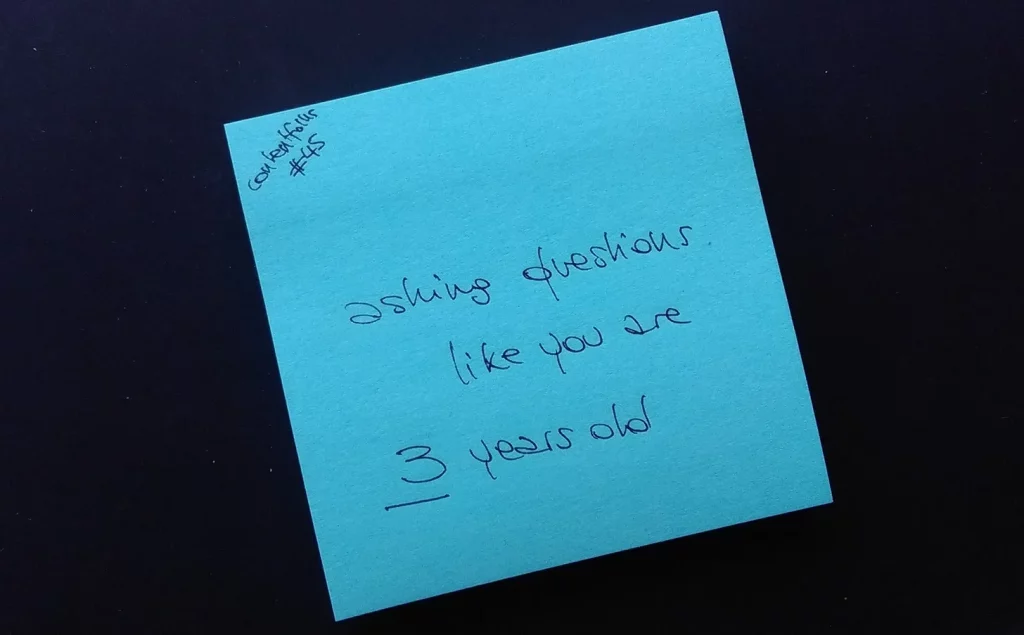
You are reading contentfolks—a fortnightly blend of sticky notes, big content ideas, and small practical examples. Thank you for being here! ~fio
Hey 👋
If you’ve been around small kids, you’ll know most of them go through a phase of relentlessly asking why? why? why? about everything. That’s because they find themselves surrounded by an overwhelming amount of stuff they need to make sense of, and ‘why?’ questions help collect relevant information in a short amount of time.
…which is not far from what happens most days at work, when we, too, find ourselves surrounded by an overwhelming amount of stuff we need to make sense of, and ‘why?’ questions could help collect relevant information in a short amount of time—except we, as adults, are nowhere near as good at ‘why?’ questions as our former three-year-old selves.
Why you should ask more ‘why?’ questions
‘Why?’ questions help gather information and build your understanding of how things work before you take action. At work, they come in handy when you:
- Are told to do [something] without being given the right context
- Don’t understand how a decision was made
- Want to figure out why things are done in a certain way
- Receive feedback you don’t quite get
- See opportunities for improvement but nobody grabbing them
- Are curious about something and want to know more
Obviously, there is a difference between asking ‘why?’ because you want to engage the other person and make sense of things vs. asking ‘why?’ to make a snarky comment or indirect accusation (I assume we’re all interested in the former). Genuinely asking more questions like Why did we make this decision? Why do you need this data? Why has nobody done [thing] like this before? will give you to a deeper and clearer understanding of the bigger picture, which in turn empowers you to do your job better.
💡 A practical example 💡
Our Postmark team was recently acquired by ActiveCampaign, so I’ve been on Zoom calls with some new people to learn about our respective roles and how we can work together.
At some point in one of these calls, my AC colleague was illustrating a particularly ambitious goal they’re working towards. I had two ways to continue the conversation:
- Respond to the letter of their statement by offering a comparable example of an audacious goal and how we set out to achieve it
- Investigate the spirit of the statement by asking a ‘why?’ question to dig deeper into the reasons for the goal itself
Based on what I’ve written so far, you’d expect me to have picked the second option… but nope, I messed up 🤦♀️
I went with the first option, offered a comparable story, and we quickly moved on to the next topic. Then of course, about ten minutes after the call ended, my number one thought suddenly became “but why are they trying to do it?,” and this question stayed with me for days.
I’m usually a good asker of ‘why?’ questions, and yet it was easy for my brain to just go on autopilot. What a wasted opportunity. I am still annoyed about it!
When you’re three years old, ‘why?’ questions come naturally—but as you grow old, you’re not generally taught or encouraged to ask them. Some of us may even be actively dissuaded from asking ‘why?’ too many times, especially to someone in a position of authority, to avoid coming across as annoying or confrontational.
So here is a final tip: if you start asking ‘why?’ questions today, pay attention to your tone in person and be extra careful when writing. You might even want to reword a ‘why’ question into a ‘how’ one, so your intentions are clearer:
- Why are you asking me to do [this] → How does [this] fits into our larger plan?
- Why did we make this decision? → How did we get to this decision?
- Why did you make that edit? → Can you help me understand how this version works better?
…why don’t you give it a try? 😉
